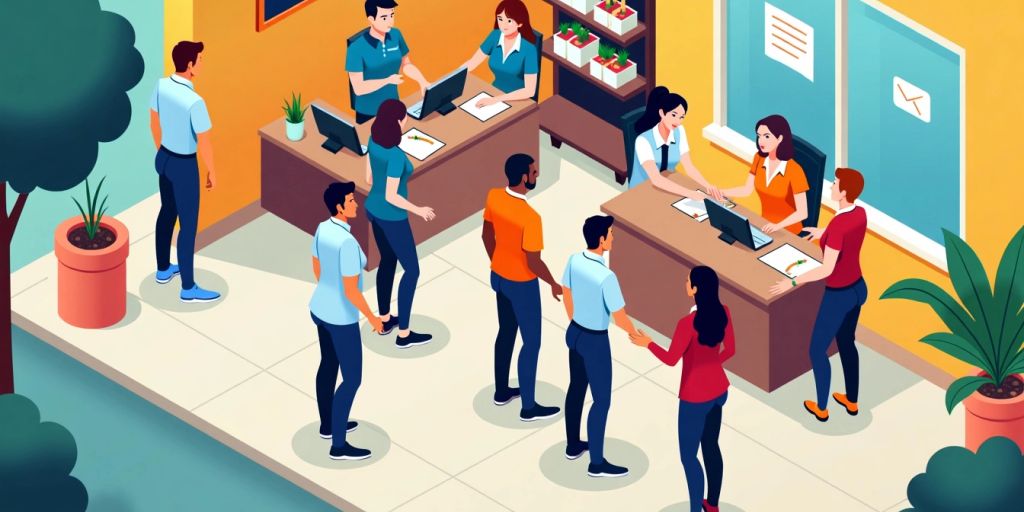In this article, we will discuss effective strategies that can help small businesses improve their customer service. By using modern technology, making the best use of available resources, and encouraging creative problem-solving, you can provide outstanding service that keeps your customers happy. Good customer service is not just about meeting expectations; it’s about exceeding them. This article will guide you through several approaches that can help your business stand out without breaking the bank.
Table of Contents
ToggleKey Takeaways
- Good customer service builds strong relationships and keeps customers coming back.
- Using technology like chatbots can help you provide support 24/7 and reduce the workload on your team.
- Offering self-service options allows customers to find answers quickly and at their own convenience.
- Outsourcing customer support can help manage busy times without hiring more staff.
- Personalizing interactions makes customers feel valued and improves their overall experience.
The Importance of Customer Service for Small Businesses
Customer service is crucial for small businesses, acting as the foundation for lasting success. Exceptional service can set you apart from competitors and create loyal customers. Here’s why it matters:
Building Long-Term Customer Relationships
- Trust and Loyalty: Good service builds trust, encouraging customers to return.
- Word of Mouth: Satisfied customers often share their experiences, bringing in new clients.
- Feedback Loop: Engaging with customers helps you understand their needs better.
Differentiating in a Crowded Market
- Unique Selling Point: In a competitive landscape, outstanding service can be your unique edge.
- Customer Retention: Keeping existing customers is often cheaper than acquiring new ones.
- Brand Reputation: Positive experiences enhance your brand’s image.
Increasing Customer Lifetime Value
- Repeat Business: Happy customers are more likely to make repeat purchases.
- Upselling Opportunities: Satisfied customers are open to trying new products or services.
- Higher Spending: Loyal customers tend to spend more over time.
Investing in customer service is not just about solving problems; it’s about creating memorable experiences that keep customers coming back.
In summary, prioritizing customer service can lead to significant benefits for small businesses, including stronger relationships, a competitive edge, and increased revenue.
Leveraging Technology to Enhance Customer Service

In today’s fast-paced world, using technology is essential for small businesses to improve their customer service. By adopting the right tools, businesses can create a more efficient and satisfying experience for their customers.
Utilizing Chatbots and Automation
Chatbots are a game-changer for customer service. They can handle many tasks, such as:
- Answering common questions 24/7
- Booking appointments
- Initiating support tickets
This means businesses can provide help even when staff are not available. Chatbots can also learn from conversations, making them smarter over time. This technology allows small businesses to compete with larger companies by offering quick responses and support.
Implementing CRM Systems
Customer Relationship Management (CRM) systems help businesses keep track of customer interactions. With a CRM, you can:
- Store customer information
- Track purchase history
- Manage follow-ups and communications
This organized approach helps businesses understand their customers better and tailor their services to meet their needs.
Adopting Omnichannel Support
Offering support through multiple channels is crucial. Customers want to reach out via their preferred method, whether it’s:
- Social media
- Phone calls
By providing omnichannel support, businesses can ensure that customers receive consistent and seamless service, no matter how they choose to connect.
Embracing technology in customer service not only enhances efficiency but also builds stronger relationships with customers, leading to long-term loyalty.
In summary, leveraging technology like chatbots, CRM systems, and omnichannel support can significantly enhance customer service for small businesses. By investing in these tools, businesses can create a more responsive and personalized experience for their customers, ultimately leading to greater satisfaction and loyalty. This is essential for thriving in a competitive market.
Optimizing Resources for Effective Customer Service

In today’s fast-paced world, small businesses must find ways to optimize their resources to provide excellent customer service. Streamlining operations can lead to happier customers and better business outcomes.
Automating Routine Inquiries
Automating simple questions can save time for both customers and staff. Here are some benefits of automation:
- Faster response times: Customers get answers quickly.
- Reduced workload: Staff can focus on more complex issues.
- Cost-effective: Saves money on staffing needs.
Cross-Training Staff
Cross-training employees ensures that everyone can assist customers effectively. This strategy includes:
- Flexibility: Staff can cover for each other during busy times.
- Skill development: Employees learn new skills, enhancing their value.
- Team cohesion: Encourages collaboration among team members.
Using Temporary Help for Surges
During busy periods, consider hiring temporary staff. This approach can help manage increased demand without long-term commitments. Key points include:
- Scalability: Adjust staff levels based on demand.
- Cost control: Only pay for help when needed.
- Quick onboarding: Temporary staff can be trained quickly to assist with routine tasks.
By optimizing resources, small businesses can elevate their customer service without stretching their budgets too thin. This approach not only meets customer expectations but also enhances overall satisfaction.
In summary, optimizing resources through automation, cross-training, and temporary help can significantly improve customer service. These strategies allow small businesses to compete effectively in a crowded market, ultimately leading to increased customer loyalty and satisfaction. Remember, effective resource management is key to success!
Implementing Self-Service Options
Promoting Self-Service Tools
Creating self-service options is essential for modern customer service. By allowing customers to find answers on their own, you can improve satisfaction and reduce wait times. Here are some effective self-service tools:
- Knowledge Base: A collection of articles that answer common questions.
- FAQs: A section with clear answers to frequent inquiries.
- Community Forums: A space for customers to discuss and help each other.
Setting Up Community Forums
Community forums can be a great way for customers to connect. They allow users to share experiences and solutions. Appointing community managers can help keep discussions on track. This approach is especially useful for complex issues, making it easier for customers to find help.
Ensuring 24/7 Availability
Having self-service options means customers can get help anytime. This is crucial because many customers expect support outside of regular business hours. A well-structured self-service system can lead to happier customers and lower support costs.
Outsourcing Customer Support
Outsourcing is a smart way for small businesses to manage customer support without stretching their resources too thin. By partnering with external providers, you can handle more customer inquiries efficiently. Here are some key points to consider:
Identifying the Right Partners
- Look for companies that complement your services. For example, if you run an online store, consider teaming up with a shipping company.
- Ensure that the partner has a good reputation for customer service.
- Check if they have the necessary technology to support your needs.
Establishing Service Level Agreements
- Create clear agreements that outline how your partner will assist you. This includes:
- Response times for customer inquiries.
- How they will resolve issues.
- Communication methods with customers.
Maintaining High Customer Satisfaction
- Regularly check in with your partner to ensure they meet your standards.
- Provide them with training on your products or services.
- Gather feedback from customers to see how well the outsourcing is working.
Outsourcing customer support can help your business grow while keeping customers happy. It allows you to focus on what you do best, like product development and marketing.
By using outsourcing wisely, small businesses can provide excellent customer service without the need for a large in-house team. This approach not only saves money but also enhances customer satisfaction, making it a win-win situation.
Personalizing Customer Interactions
Remembering Customer Preferences
Personalizing customer interactions is essential for building strong relationships. By remembering customer preferences, businesses can create a more engaging experience. This can include:
- Keeping track of past purchases
- Noting preferred communication methods
- Recognizing special dates like birthdays
Tailoring Communications and Offers
Tailoring communications and offers to individual customers can significantly enhance their experience. Use data to:
- Send personalized emails with relevant product suggestions.
- Offer discounts based on previous purchases.
- Create targeted marketing campaigns that resonate with specific customer segments.
Providing Personalized Rewards
Implementing personalized rewards can make customers feel valued. Consider:
- Creating loyalty programs that reflect individual buying habits.
- Offering exclusive deals for frequent customers.
- Sending thank-you notes or small gifts to show appreciation.
Personalization is not just a trend; it’s a strategy that can lead to lasting customer loyalty. When customers feel understood, they are more likely to return.
In summary, personalizing customer interactions can boost your business by fostering deeper connections and enhancing customer satisfaction. By remembering preferences, tailoring communications, and providing personalized rewards, small businesses can stand out in a competitive market.
Empowering Front-Line Employees
Authority to Make Decisions
Empowering front-line employees means giving them the authority to make decisions that can quickly resolve customer issues. For example, allowing a customer service representative to offer small discounts or solutions without needing a manager’s approval can lead to faster resolutions and happier customers.
Tools for Effective Assistance
To help employees assist customers effectively, businesses should provide the right tools. This includes access to customer data, chat transcripts, and training resources. Investing in comprehensive training ensures that employees are well-prepared to handle various situations.
Training and Development Programs
Regular training and development programs are essential. Here are some key points to consider:
- Conduct workshops on communication skills and customer empathy.
- Use real-life scenarios for training to prepare employees for actual customer interactions.
- Monitor performance continuously to motivate agents and improve service standards.
Empowering employees not only boosts customer satisfaction but also creates a culture of ownership and excellence within the team.
By focusing on these strategies, small businesses can enhance their customer service and build stronger relationships with their clients.
Empowering your front-line employees is crucial for any business. When you give them the tools and support they need, they can provide better service and solve problems faster. This not only helps customers but also boosts your sales. Want to see how our live chat solutions can help your team? Visit our website for a free demo!






